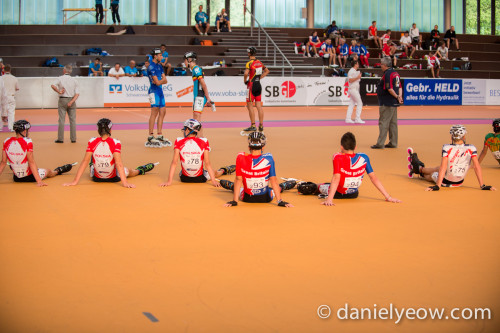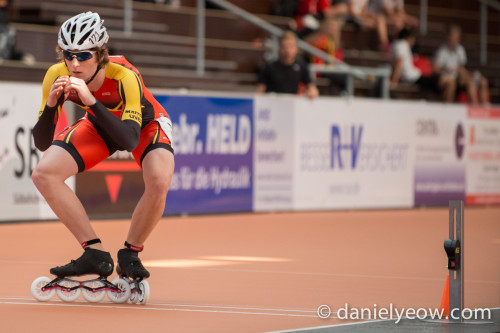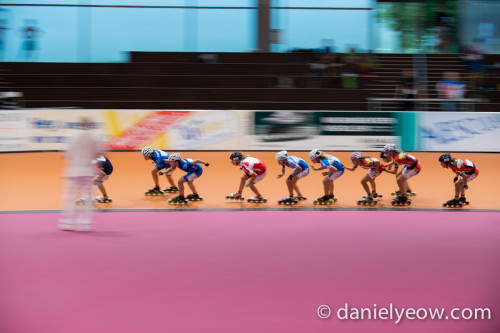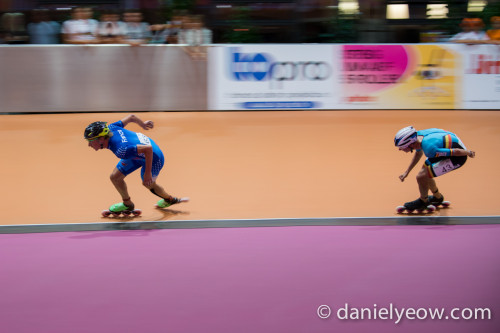Inline Euros 2014 – Day 1
If I had to describe today in a word, I would have to say “long”. Part of the reason for this is because the first day of competition is when they contest the 300m time trials. These time trials are all run individually, and so you can see how the length of a skating day can be extended if you have a large number of participants.
Luckily, despite the rules allowing for three skaters per country per event, not all countries will use all three places since the time trial is quite a sprint-specialist event, and it is not common to have so many specialist sprinters in all but the biggest national teams. Italy, Germany, and France for example have some of the biggest teams, and will usually have three skaters in the time trial in both Junior A/B and Senior categories, but smaller teams like Denmark for example won’t.
Less than 10 years ago, the format of the time trial changed significantly. In past years, everyone did their time trial once and skaters were ranked according to their times and that was it. Now there are ‘heats’ where everyone does their time trial once, but then the top 12 (or another number depending on the competition) get to do it again later in the day, in a ‘final’. This has had the interesting effect of improving the times, since the sprinters who make the final get to iron out the small problems in their first run.
Today’s highlight was undoubtedly Simon Albrecht’s 300m time, a staggeringly quick 23.003 seconds. To put this in perspective, the world record in 1995, when I started skating international competition, was 24.99 seconds. The most recent official world record, set just under a year ago in Oostende, Belgium was 23.891. The thing to remember here is that Simon is not yet a senior skater, and thus has some improving to do before he really hits his peak. Another thing to remember is that the fastest senior skated his time trial in 23.538 seconds. Simon is, of course, a bit of an outlier since the next fastest junior time was 24.244 seconds and wouldn’t have even made the top 10 in the senior final.
After the time trials were the points/elimination races. These are horribly painful things to race, but they are also in a sense very beautiful because everything has to come together just right for you to be able to win one. For skaters who aren’t particularly good at long distances (like myself) the chief concern is the elimination laps. Depending on how many starters there are, the officials will eliminate a certain number to leave a certain number of finishers. Those numbers vary a lot depending on the competition and the number of starters, but basically someone rings a bell, and on the next lap the person in last place is eliminated. For the people who are actually in contention to win the race, there are the points laps which occur at regular intervals (usually every two laps) and points are awarded to whomever is in first and second place.
As you can imagine, having the twofold motivation of worrying about being eliminated as well as having to think about collecting points makes these races brutal. I’ve never finished a points race at anything higher than a national level competition, and even for those skaters eliminated relatively early in the race (such as myself) the experience is very painful. Strategy is very important, as is having good team mates. The larger countries, like France, Italy, and Germany often have enough depth to field three useful competitors (one designated winner and two ‘helpers’). A long time ago, radios and earpieces were allowed, and skaters would often be getting instructed by a coach with a good overview of the whole track. Nowadays that isn’t allowed, so it is up to the skaters to be aware of their surroundings and so also execute their own strategy.
Two races from tonight stand out in my mind – the Junior A ladies 10k points/elimination (yes, they really skate 10 kilometers, crazy!) which was highlighted by a very clever and well-executed move by the Danish skater Elena Rigas, who went on a breakaway and was joined by eventual winner Deborah Marchand from France. The two worked together to stay away from the pack and between them were able to collect a lot of points. Deborah was much stronger however, and eventually dropped Elena who was eventually swallowed by the pack. Then there was a crash and the judges screwed up a bit and technically called off the race, except that they didn’t… and in the confusion some skaters stopped while others continued to race. At the end of all the chaos, Sandrine Tas of Belgium managed to catch the lead pack and collect enough points to pass Elena and go into second place. Then there was some controversy because Elena was disqualified after the race finished because she had been lapped, even though she had only been lapped by Deborah (and she was the third-ranked skater on points anyway).
In a strict technical sense, when the judges incorrectly called off the race because of the crash, that invalidated anything that happened after the whistle was blown. Correct procedure would have been to rerun the race later in the schedule. Of course… nobody wanted to do that.
The second race that stood out in my mind was the Senior men points/elim. Often in these races there are usually only two or three people who are in serious contention to win, and who are seriously contesting for points. However, at one stage in the race there were as many as six skaters who were legitimately in the running to win, which made for an interesting dynamic. World champion at this distance, Belgian Bart Swings started the race strong and collected a lot of early points but perhaps didn’t anticipate that the race would pan out the way it did (when there are more people racing for the points sprints, the overall pace is higher) and he tired in the second half. About two thirds through the race, it was Felix Rijhnen of Germany who made a decisive breakaway move from the pack which allowed him to collect a lot of first-place sprint points, while everyone else scrambled for seconds. In the final calculation, it was France’s Alexis Contin who proved to be the master strategist, having picked off the occasional points sprint early in the race, he stayed within striking distance, then with five laps to go he chased down Felix’s break and caught him just in time to pass him and collect the final two points sprints which gave him enough points to draw equal with Felix. Under the rules, when two skaters have an equal number of points, the order is decided by finishing order over the line, and so Alexis had outsmarted Felix into second, with Bart a close third.
Full results from the track competition can be found here.
Don’t forget to check out the photo page.





Leave a comment